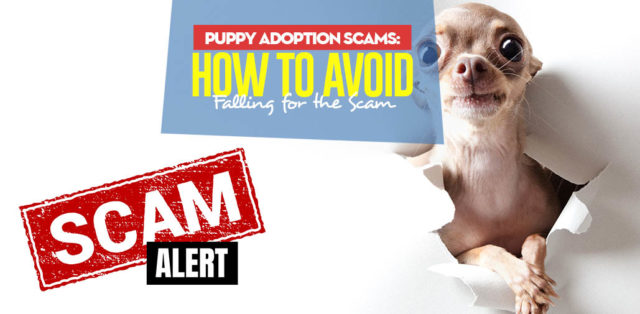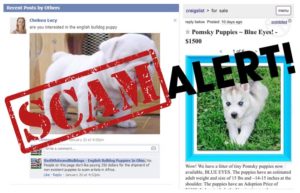
Table of Contents
Adopting a dog instead of buying one from a breeder is a commendable thing.
But not everybody goes to a local shelter or adoption center to adopt a puppy.
Many decide to look for a puppy they would like to adopt online (on sites like Craigslist and the like).
While there are many legitimate ads out there, it's also where scammers lurk and look for the next victim.
If you are thinking about adopting a puppy online, you need to be aware of the type of scams that are going on the Internet and be careful if you don’t want to end up without your money and without a puppy.
Here's everything you better keep in mind about adopting a puppy and avoiding puppy scams.
How do Puppy Scammers Operate?
Scammers are a pretty usual presence on the Internet, but in recent years, they have managed to work their way into the pet space.
They scam people looking to buy or adopt a dog or a puppy by posting ads on Craigslist, E-bay, or Facebook.
In these ads, scammers use photos of puppies from the Internet or their own photos.
However, the puppy doesn’t exist.
Most commonly, they post an ad offering expensive breeds for adoption — you only have to pay for the shipping.
Here's what an ad may look like:

If you are wondering at this point why you would pay anything when you can adopt a puppy for free at your local shelter, there are multiple reasons why victims choose to do so.
Fraud.org site has a write-up on how these scams often happen.
First of all, even if you adopt a puppy at a local shelter, it's never completely free.
You will still have to pay a fee, which covers the cost, or at least a part of the cost, of taking care of the adopted puppy.
Second, you don’t often find purebred dogs or puppies at your local shelter, and getting them at such a low price as advertised by these scammers feels like a chance you can’t miss.
Once you send the money to these scammers, they will usually make up a story about why they need more.
They will probably tell you that the puppy is stuck at the airport because he must have insurance to travel.
When you send them more money, you will hear no more of them, and you are left without a puppy and without a hefty sum.
These scammers often use the names of legitimate pet shippers, and victims don’t suspect that everything is a scam.
They illegally use logos of reliable companies as well.
Beware those offers that seem too good to be true — they often are!
How to Recognize Scammers?
 Being aware that these scammers exist is a good first step to avoid falling prey to them.
Being aware that these scammers exist is a good first step to avoid falling prey to them.
When you know that they are out there, you will be careful not to get scammed.
However, there are some specific things you should know so you can be able to recognize a scammer.
Keep in mind the following:
- Watch out for the reasons they name for parting with their puppy. If they mention family hardship, death of the owner, relocation, bad climate, or similar excuses, it is probably a scam.
- If they use a free Gmail, Yahoo, or another similar email, you should be careful, especially if they are using it to present themselves as a reputable pet shipping company.
- Scammers usually refer to puppies as their babies and insist that they are looking for a loving and caring owner for them. They also often send a list of questions and ask you to answer them.
- They mention a specific “courier” that will deliver the puppy to you, but they never say the name of that courier.
- If they offer the puppy in one location that is close to you and then make up some reason why the puppy is in some other location where you can’t see him or pick him up, it is definitely a scam.
- Look out for scammers if they ask for a payment via Western Union, MoneyGram, or some other similar service. They might even ask you to say that you are sending money to a family member and not to buy something.
- The most important thing to remember is that you can’t ship a puppy internationally for $250-300, which is what most scammers ask for shipment. Just remember that it is more expensive to send a puppy to another international location than for a person to fly, especially since there are other expenses included, like kennels, veterinarian services, etc.
- Also, if they tell you that they will ship the puppy in less than a day after they receive the payment, they are lying because it takes a lot more time to obtain proper documentation to ship a puppy internationally.
- The English used in emails or text messages is usually pretty bad since scammers are from another country. Poor spelling and grammar should signal that something is fishy.
- They want to make the transaction happen as fast as possible, and they will usually use some sad story as an excuse.
- They never reveal their name, address, or phone number or show you any photos of themselves, their business, or their home. Usually, they try to get you to feel sympathetic to them by telling you how they are a nice married couple and how one of them lost a job recently or is handicapped, for example.

How to Avoid Getting Scammed
If you would really like to adopt a puppy online instead of adopting from shelters, you need to be careful and watch for the warning signs mentioned above.
If you notice things that are suspicious, try to do a little bit of investigation in order to prove that the person you are corresponding with is legit and not a scammer.
For example, ask for multiple photos of the puppy, especially in different poses and with different items.
That is the only way to make sure that the puppy is real. Also, ask for the phone number of the person who is giving the pet for adoption and avoid doing business with those who refuse this request.
The best thing to do is to completely avoid anybody who is not located in the US.
That is the safest way to go about adopting a pet online.
Also, if the person you are talking to says that they are located in the US, in one state, and then asks you to send your money to a different state or even country, you should definitely avoid it.
Avoid paying in cash via money order or Western Union.
You should always use a credit card so you can dispute the charges if necessary.
Also, be skeptical if the person you communicate with adds additional charges like vet visit fees, another crate, pet insurance, etc.
In order to avoid getting scammed, you should do research about prices for the breed you are thinking about adopting.
You should be alarmed if the price that you are given is significantly lower or if they are asking only for shipping expenses, especially if the breed in question is a purebred puppy.
You should also do an online search for the email address you have gotten from the advertiser.
They usually post their ads on multiple websites, and if you see that that is the case, avoid doing business with them.
IPATA.org maintains a partial list of puppy adoption scammers. You can check out their updated list here.
Another thing you can research online is part of the text you receive from them in email.
If that shows results, you will be able to see why — usually, it’s other people complaining about being scammed by the same person.
Another good tactic is to ask the person you are talking with to arrange for you to pick up the puppy on your own.
If they refuse to do this, then you can be sure that it is a scam.
What to Do if You Get Scammed?
 Many people get so excited by the prospect of a new puppy that they make a mistake and send money to scammers.
Many people get so excited by the prospect of a new puppy that they make a mistake and send money to scammers.
If that is the case, there are a few things you should do.
First of all, stop all communication with the scammer.
Don’t answer their emails or phone calls.
Then, report them to the IPATA.org site and file a report with your local police or other law enforcement office.
You should also file a report with the Internet Crime Complaint Center. This is the agency whose job is to deal with cyber-criminals, especially with these types of scams, which are not that rare at all.
After you deal with this, you should also contact the website where you saw the ad in the first place and let them know that the advertiser in question is a scammer.
Don’t forget to provide them with the scammer's email address.
You should also do research for the same ad on other websites and let them know as well.
You won’t get your money back after you take these steps, but you might be able to prevent further scamming by the same person, and you can help law enforcement agencies to bring them to justice.
Just don’t forget to be careful in the future so you don’t make the same mistake again.












